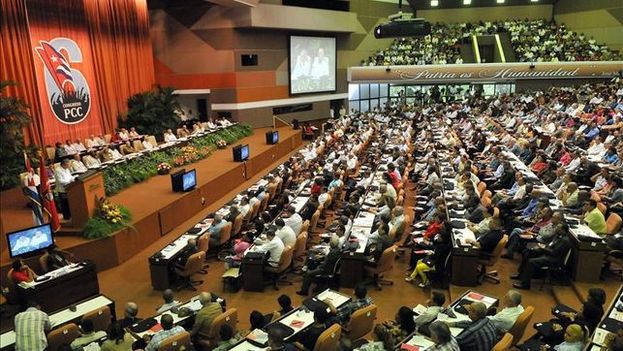
![]() 14ymedio, Reinaldo Escobar, Havana, 16 April 2016 — Five years after the Sixth Congress of the Communist Party of Cuba, the only agreement from that congress that had a fixed date will meet this Saturday: the celebration of the Seventh Party Congress. The event will begin at 10:00 am at the Palace of Conventions in Havana with the presence of one thousand delegates and 280 guests. The secrecy and speculation regarding a possible change of course or a frustrating continuity continues.
14ymedio, Reinaldo Escobar, Havana, 16 April 2016 — Five years after the Sixth Congress of the Communist Party of Cuba, the only agreement from that congress that had a fixed date will meet this Saturday: the celebration of the Seventh Party Congress. The event will begin at 10:00 am at the Palace of Conventions in Havana with the presence of one thousand delegates and 280 guests. The secrecy and speculation regarding a possible change of course or a frustrating continuity continues.
At the opening session, which will be broadcast live on national television, the main report will be read. The main documents – which were not disclosed to the public and are not even known by the mass of Party militants, which exceeds 700,000 people – will be discussed, probably behind closed doors, in four commissions.
Among the issues the delegates will address are the conceptualization of the economic and social model, the economic plan, and the analysis of the implementation of the guidelines agreed to in the previous congress. Of great importance will be the election of a new Central Committee, where changes are expected among senior positions on the Politburo.
The expectations have been many and diverse. If you follow the opinions collected by the newspaper Granma, the meeting, considered “the congress of all Cubans,” should be characterized by continuity and “improving the economic and social model,” at least that is what different interviews with some of the delegates elected to the conclave have reflected.
Within this line they insist on the anti-imperialist character of the process and have repeatedly alluded to the will not to cede a single inch in matters considered unshakable principles.
Some commentators have slipped less orthodox views into the digital pages of the official Party organ. Among these are suggested changes that exceed the limits of continuity, including greater openness in the economy with the more flexible creation of non-agricultural cooperatives, and allowing the formation of small and medium enterprises in the non-state sector. Bolder actions demanded include the elimination of the dual currency and greater flexibility in all matters relating to the ownership of property.
With regard to politics, those who are hopeful that the Congress could introduce reforms in this area have referred to the need to introduce amendments to the Constitution and to offer a new electoral law. In a general sense there is a demand for the amplification of rights related to freedom of association and expression.
However, for the opposition sector to expect anything from this meeting of communists is a delusion. The most extreme are offended by any analysis that expresses the idea that the event could result in something positive.
Most observers agree that the importance of the partisan congress is that it will be the last in which members of the “historic generation,” most of them octogenarians, are present, so this must be the occasion on which it is defined who should take over.
Speculations incline to those who would take steps to openings, based on the improvement of relations between Cuba and the United States, the difficult situation of the internal economy, and the trend of decline among Cuba’s main allies on the continent. Those who are betting on the stagnation option rely on the traditional attachment to power of those who have spent more than half a century at the helm in Cuba, and their fear that the slightest concession could lead to an undesirable outcome.
As part of the symbolic aspect to be imprinted, the opening of the Congress coincides with the 55th anniversary of the declaration of the socialist character of the Revolution, while the closing session announced for 19 April marks five and a half decades since the military victory at the Bay of Pigs, baptized in official discourse as the first defeat of imperialism in Latin America.
When the most important event for Cuban communists opens this morning, the fate of the whole nation will be hanging on what is said in front of those microphones. The delegates to the Seventh Congress, and especially the senior Party officials, might let this opportunity pass amid the applause and vacuous statements, or they could make decisions that remove the shackles from the wheel of history.
